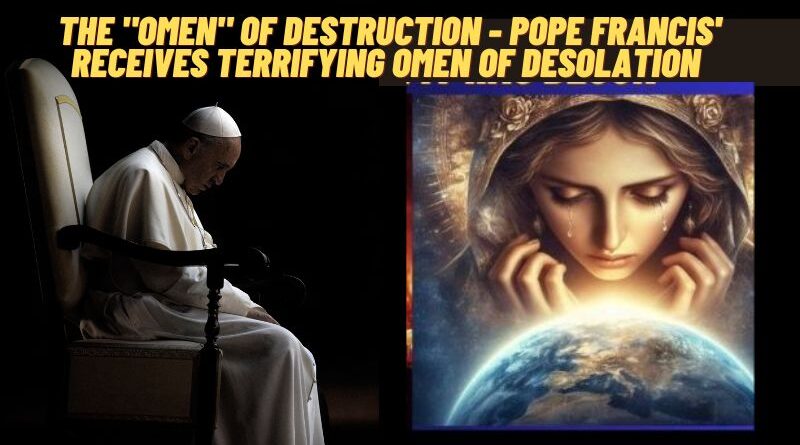Pope Francis’ “Omen” and His Warnings About the Risk of World War III
Pope Francis, the leader of the Catholic Church, has long been vocal about the state of the world, often framing his concerns in stark, evocative language. One of his most striking statements came in December 2022, when he spoke of seeing “omens of even greater destruction and desolation” for humanity. This ominous reflection, delivered during a Mass at the Vatican, underscored his deep unease about global conflicts, injustice, and the potential for a catastrophic escalation—sometimes interpreted as a warning about the risk of World War III. Over the years, the pontiff has repeatedly addressed the fragility of peace and the dangers posed by ongoing wars, suggesting that the world may already be embroiled in a fragmented version of a global conflict.
The “Omen” of Destruction
During his homily on December 12, 2022, Pope Francis painted a grim picture of the present and future. “It is a bitter time, filled with the rumbling of war, growing injustice, famine, poverty, and suffering,” he said, describing the current global landscape as “bleak and disconcerting.” He went further, noting that this troubling horizon bears “omens of even greater destruction and desolation.” These words were not tied to a specific event but rather reflected his broader observation of humanity’s trajectory, marked by ongoing conflicts like the war in Ukraine, rising inequality, and the specter of nuclear escalation.
The term “omen” carries a weighty, almost prophetic tone, suggesting an intuitive sense of impending danger. For Pope Francis, this was not merely rhetorical flourish. He linked the present struggles to historical patterns of exploitation and violence, referencing the appearance of Our Lady of Guadalupe nearly 600 years ago as a moment of divine accompaniment during times of hardship. In his view, today’s crises—war, poverty, and environmental collapse—signal a need for urgent reflection and action.
A Third World War “in Pieces”
Pope Francis has long articulated a unique perspective on global conflict, describing it as a “Third World War fought piecemeal.” This concept first emerged in his public statements years ago and has since become a recurring theme. In June 2022, for instance, he reiterated this idea, saying, “Several years ago, I got the idea to say that we are going through the Third World War in parts and pieces. So, for me, the Third World War broke out today.” He views the scattered but interconnected conflicts around the world—Ukraine, Syria, Yemen, and beyond—not as isolated incidents but as fragments of a larger, more perilous whole.
This framing departs from traditional notions of world wars as singular, all-encompassing events. Instead, Francis sees a slow-burning crisis, fueled by greed, nationalism, and indifference. The war in Ukraine, which began with Russia’s invasion in February 2022, has been a particular focus of his concern. He has called it “an extremely dangerous situation,” noting in 2022 that the world appeared closer to nuclear war than at any time since the Cuban Missile Crisis of 1962. His warnings resonate with fears of escalation, especially as tensions between major powers like Russia, the United States, and NATO continue to simmer.
A Call to Action Amid Despair
Despite the bleakness of his outlook, Pope Francis consistently pairs his warnings with a message of hope and responsibility. In his 2022 homily, he emphasized that even amid these “omens,” there is a “propitious time of salvation.” He urged the faithful—and humanity at large—to see the current moment as an opportunity for change, rooted in divine love and collective action. “The God who so loved the world sent us his Son… so that whoever believes in him should not perish but have eternal life,” he said, framing the crisis as a spiritual as well as a practical challenge.
This duality—acknowledging danger while advocating for redemption—defines his approach. He has called for dialogue, disarmament, and solidarity, often criticizing the arms trade and the economic systems that perpetuate inequality. His comments about caravans of Latin American migrants “seeking freedom and well-being” in the United States, made in the same 2022 address, highlight his concern for the marginalized, whom he sees as victims of the same forces driving global instability.
Context and Interpretation
Pope Francis’ warnings about World War III and his reference to “omens” come at a time of heightened global anxiety. The war in Ukraine, now in its third year as of March 2025, remains a flashpoint, with no clear resolution in sight. Meanwhile, other conflicts, climate crises, and political polarization continue to strain international relations. Some interpret his words as a literal prediction of a third global war, while others see them as a metaphorical call to recognize the cumulative toll of humanity’s failures.
His perspective aligns with his broader papacy, which has prioritized peace, environmental stewardship, and social justice. Unlike political leaders, Francis does not propose specific policies but instead appeals to conscience, urging individuals and nations to confront the root causes of conflict—greed, power, and apathy.
Conclusion
Pope Francis’ invocation of “omens of even greater destruction and desolation” and his characterization of a Third World War “in pieces” reflect a profound unease about the world’s direction. As of March 28, 2025, his words feel increasingly relevant, with global tensions showing no signs of abating. Yet, his message is not one of resignation but of urgency—a plea to heed the warning signs and work toward a different future. Whether humanity rises to this challenge remains an open question, but for the pontiff, the stakes could not be higher.



